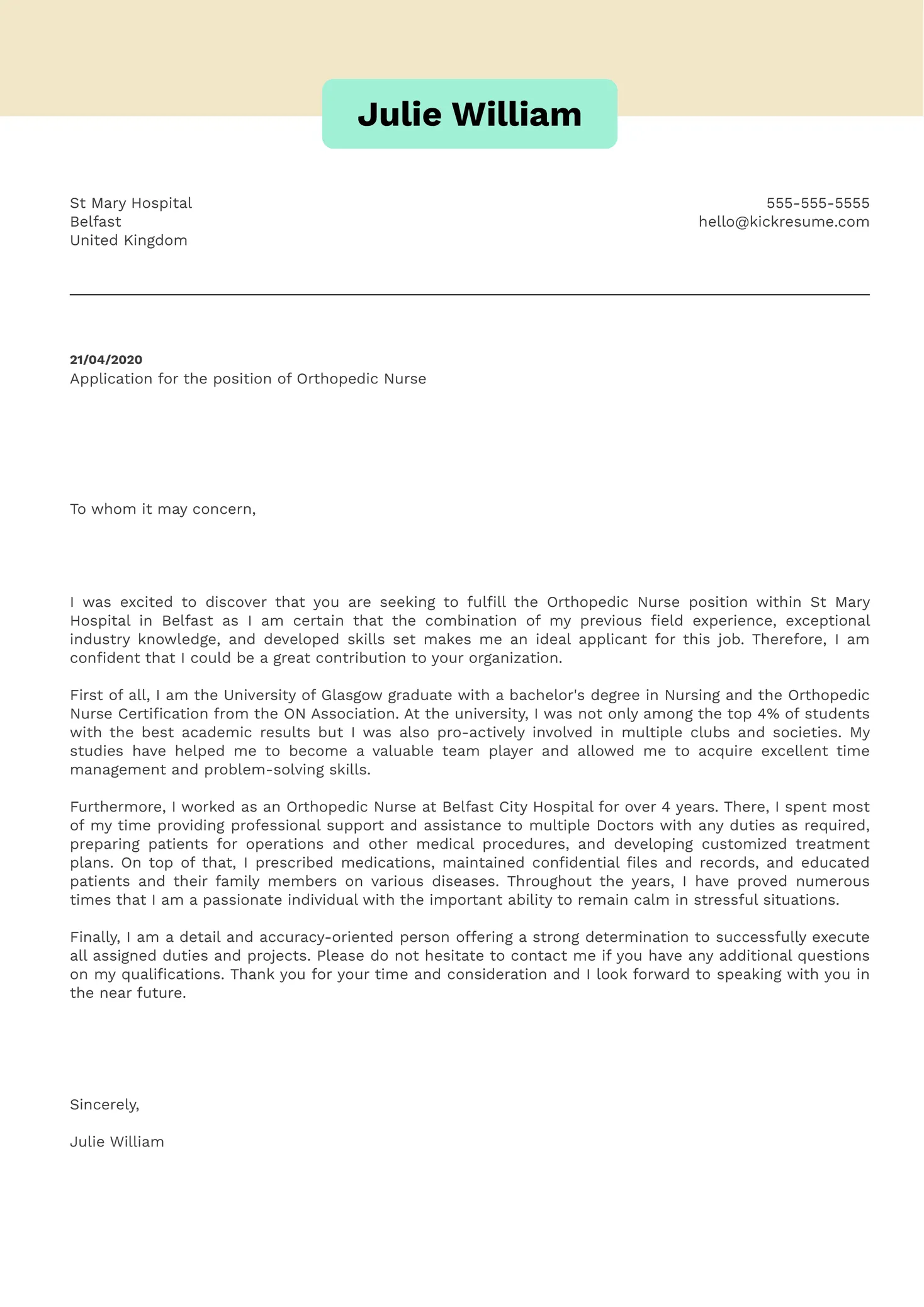The Importance of a Nurse Cover Letter
In the competitive field of nursing, a well-crafted cover letter is your first opportunity to make a strong impression. It’s more than just a formality; it’s a crucial tool that can significantly increase your chances of landing an interview. A compelling cover letter showcases your personality, passion, and unique qualifications, setting you apart from other applicants and demonstrating your genuine interest in the specific role and organization. Don’t underestimate the impact a thoughtfully written cover letter can have on your career prospects.
Why a Cover Letter Matters for Nurses
A nurse cover letter serves as a detailed introduction to your qualifications, allowing you to go beyond the limitations of a resume. It allows you to connect your skills and experience to the specific requirements of the job. It provides an opportunity to explain career transitions, address any gaps in your employment history, and demonstrate your understanding of the healthcare facility’s mission and values. A well-written letter highlights your communication skills, critical for effective patient care, and your ability to articulate your career goals.
How a Cover Letter Differentiates You
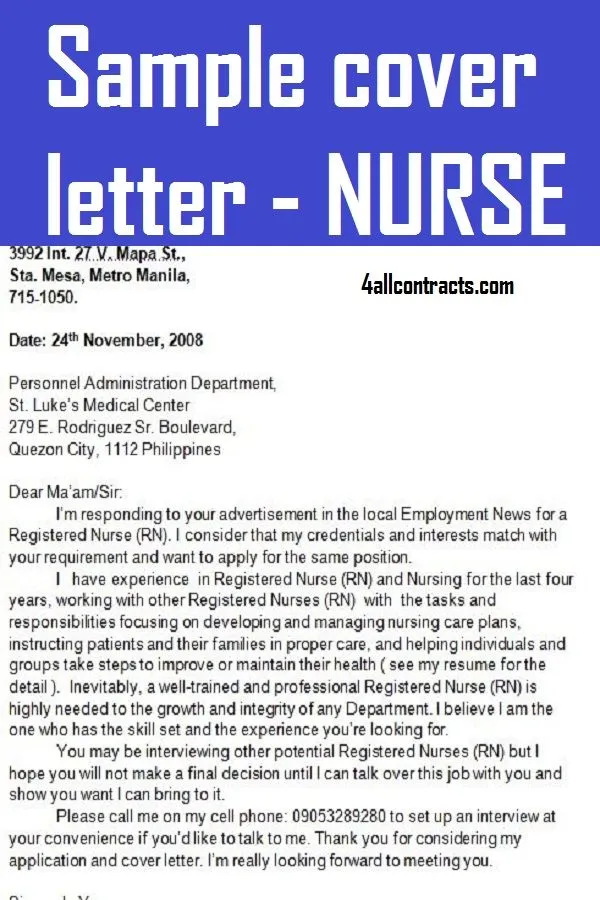
Your resume lists your experience; your cover letter tells your story. It’s your chance to infuse your personality and passion into your application. By highlighting specific accomplishments and tailoring your letter to the role, you show that you’ve done your research and are genuinely interested. This personalized approach differentiates you from candidates who submit generic applications. A strong cover letter demonstrates that you are proactive and prepared to contribute meaningfully to the healthcare team.
Key Components of a Powerful Nurse Cover Letter
Contact Information and Salutation
Begin with your full name, address, phone number, and email address. This ensures that the hiring manager can easily contact you. Next, address the hiring manager by name. Research their name and title (e.g., ‘Dear Ms. Smith’ or ‘Dear Dr. Jones’). Addressing the letter to a specific person shows that you’ve taken the time to investigate and shows a higher level of interest than a generic greeting.
Crafting a Strong Opening
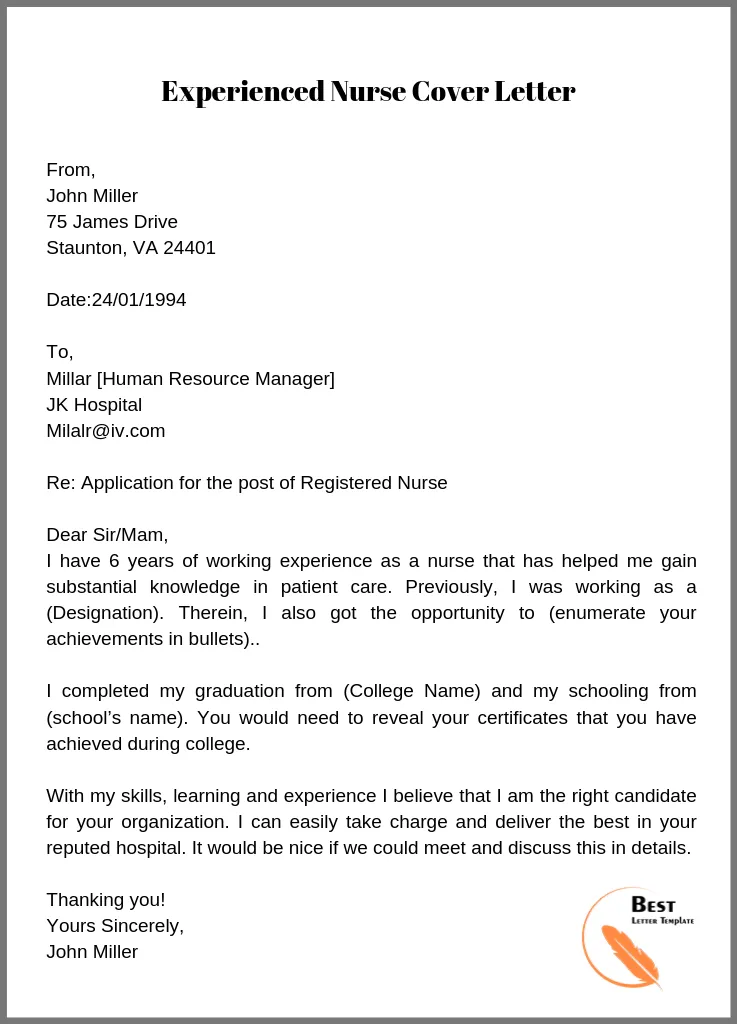
Your opening paragraph is your hook. Start with a compelling statement that immediately grabs the reader’s attention. State the position you’re applying for and briefly mention how your skills align with the job requirements. Express your enthusiasm for the role and the organization. You might also mention a specific achievement or experience that makes you stand out. A well-crafted opening sets the tone for the rest of your letter and encourages the hiring manager to continue reading.
Highlighting Your Skills and Experience
This is the core of your cover letter. Focus on the skills and experiences most relevant to the job description. Use action verbs to describe your accomplishments and quantify your achievements whenever possible. Provide specific examples of how you have demonstrated these skills in past roles. For example, instead of saying ‘provided excellent patient care,’ state ‘Consistently achieved a 95% patient satisfaction rate by implementing personalized care plans.’
Clinical Skills and Expertise
Highlight your clinical skills, such as medication administration, wound care, IV insertion, and patient assessment. Mention any specialized skills or experience you have, such as experience with specific medical equipment or patient populations (e.g., geriatric care, pediatric care, critical care). Showcase your proficiency in electronic health records (EHR) systems and any relevant technical skills.
Patient Care Experience
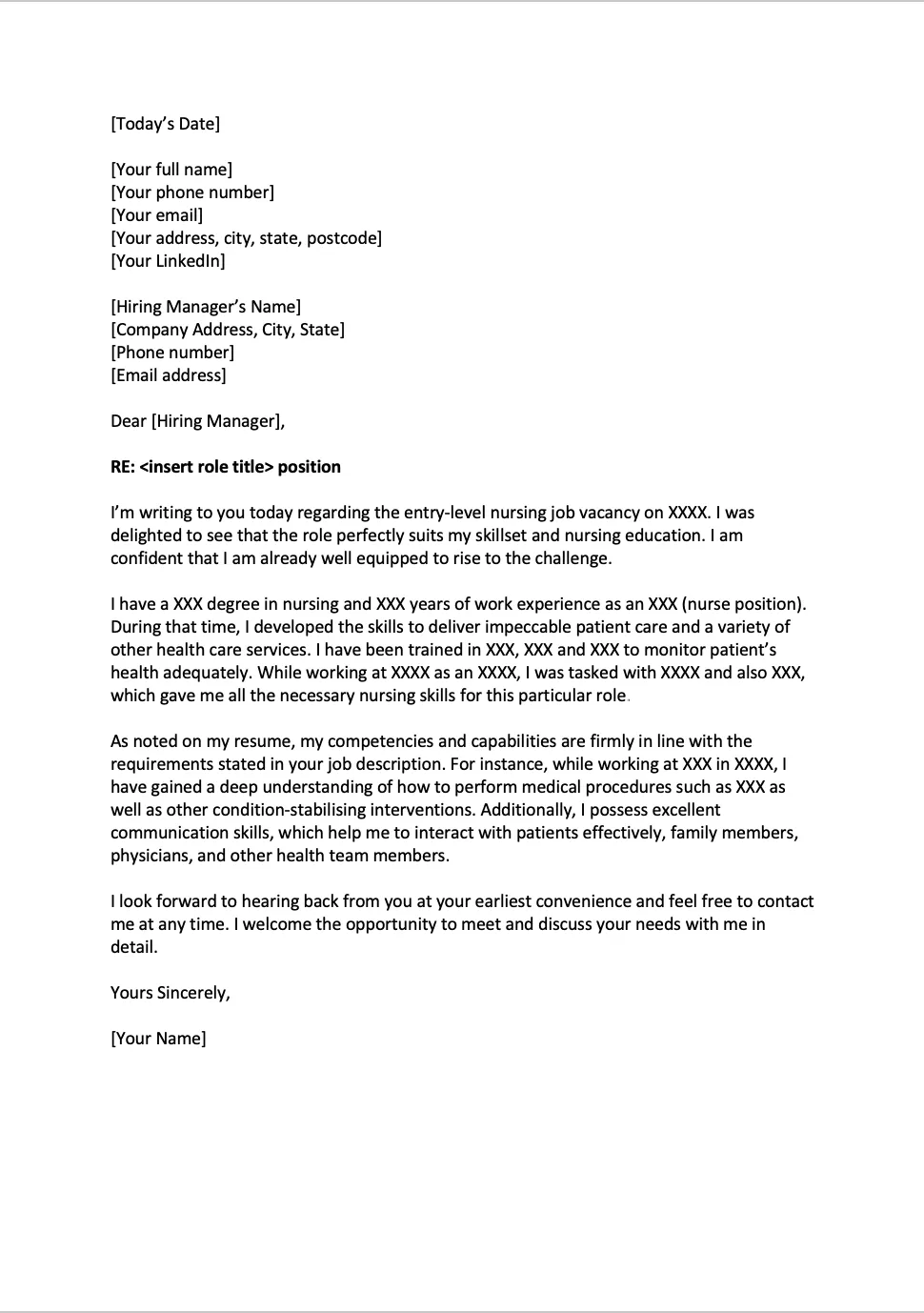
Share examples of how you have provided compassionate and effective patient care. Describe your experience with patient education, family communication, and care coordination. Illustrate your ability to work collaboratively with other healthcare professionals to ensure positive patient outcomes. Emphasize your dedication to patient safety and your commitment to providing holistic care.
Showcasing Relevant Certifications
List any certifications you hold that are relevant to the position. This may include certifications like BLS, ACLS, PALS, or specialized certifications related to your area of expertise. Ensure your certifications are current and valid. Mention any continuing education courses you’ve completed to demonstrate your commitment to professional development.
Quantifying Your Achievements
Use numbers and data to showcase your achievements. Instead of saying ‘Improved patient outcomes,’ state ‘Reduced patient fall rates by 20% through implementation of a new fall prevention protocol.’ Quantifying your accomplishments provides concrete evidence of your impact and demonstrates your ability to make a positive difference in a healthcare setting.
Expressing Your Passion for Nursing
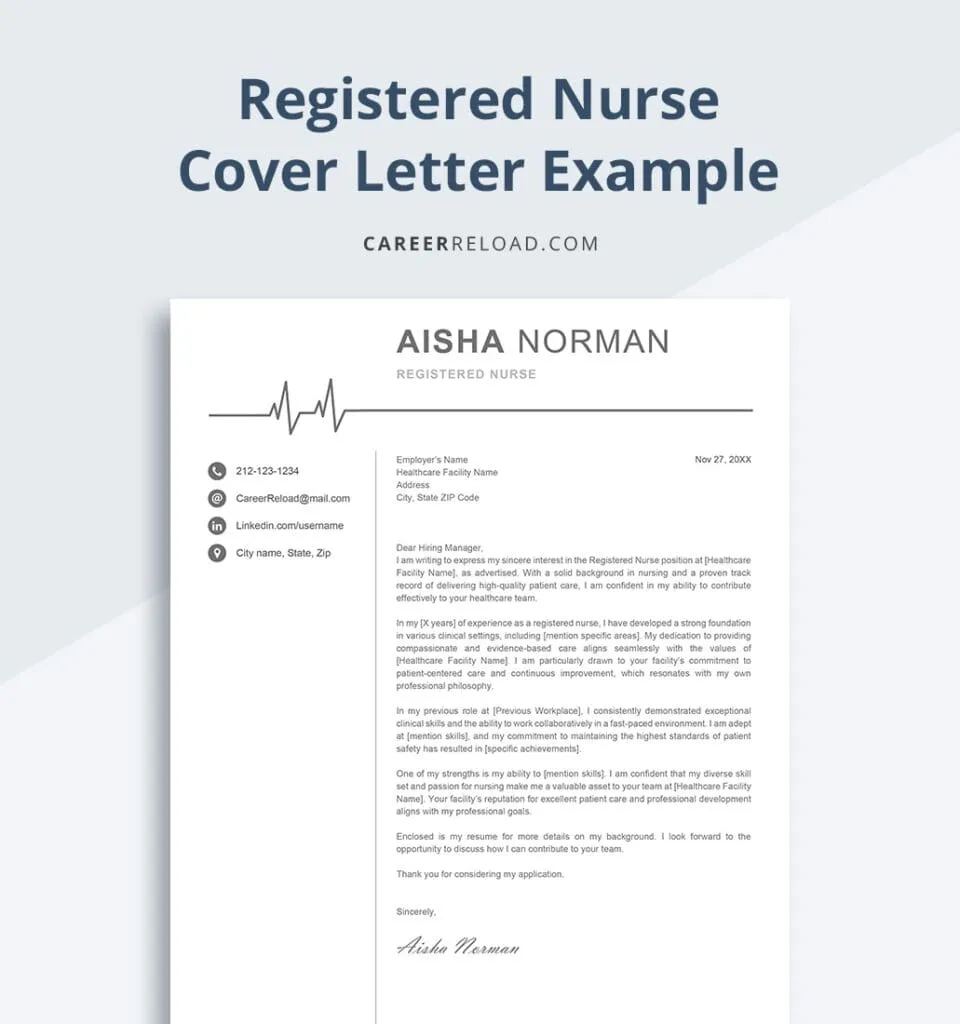
Share why you are passionate about nursing and what motivates you to provide care. Discuss your commitment to patient advocacy, ethical practice, and professional growth. Briefly touch on what you find most rewarding about nursing and what you hope to achieve in your career. Let your enthusiasm shine through.
Demonstrating Knowledge of the Organization
Research the healthcare facility and tailor your letter to demonstrate your understanding of their mission, values, and recent accomplishments. Mention specific programs, initiatives, or values that resonate with you. Explain why you are interested in working for that particular organization and how your skills and experience align with their goals. Tailoring your letter demonstrates that you are genuinely interested in the role and the organization.
The Closing and Call to Action
In your closing paragraph, reiterate your interest in the position and thank the hiring manager for their time and consideration. Include a clear call to action, such as ‘I look forward to hearing from you soon’ or ‘I am available for an interview at your earliest convenience.’ Provide your phone number and email address again, making it easy for the hiring manager to contact you.
Formatting and Proofreading Your Cover Letter
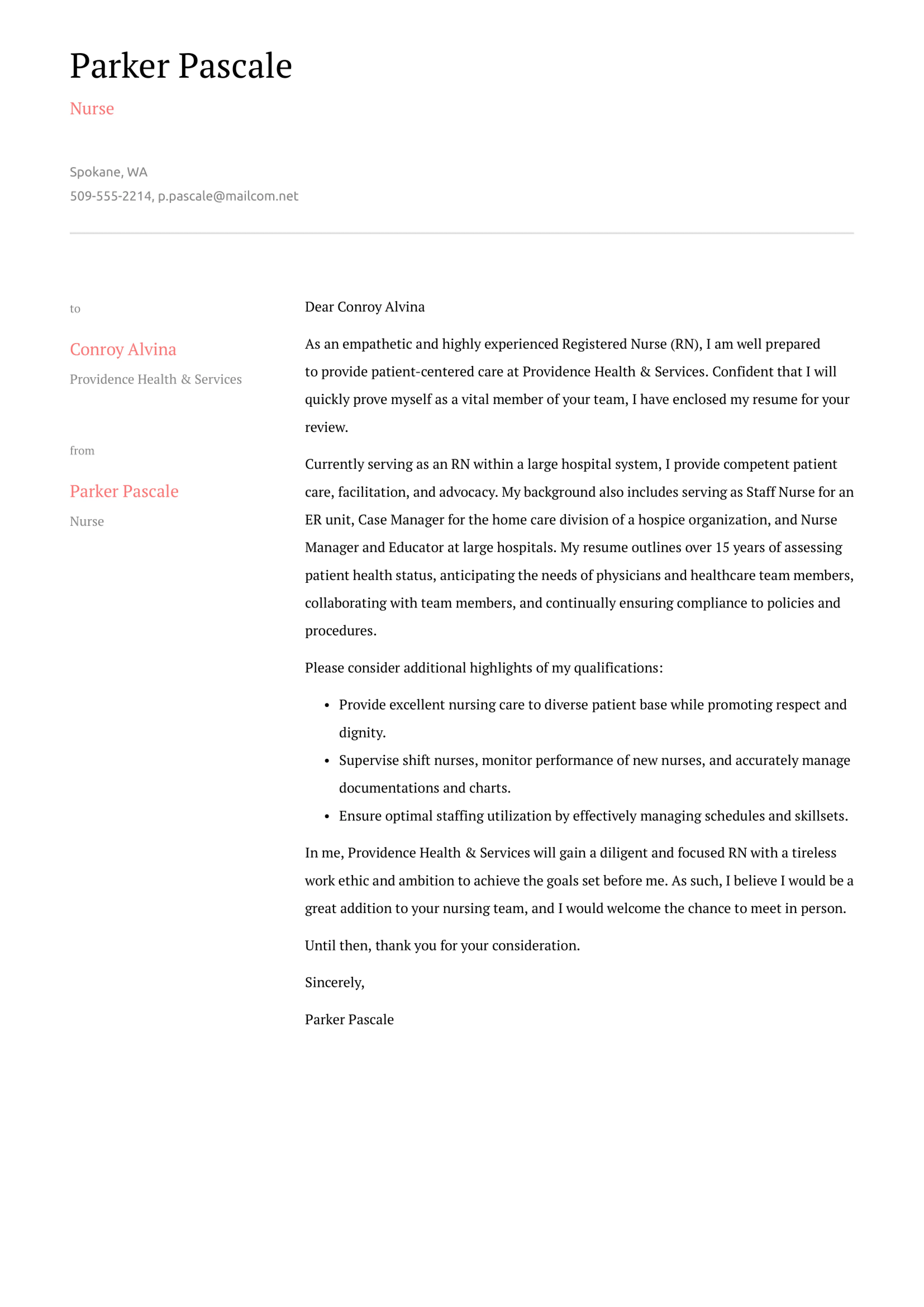
Choosing the Right Font and Layout
Use a professional and easy-to-read font, such as Times New Roman, Arial, or Calibri, with a font size between 11 and 12 points. Maintain a consistent font throughout your letter. Use standard margins (1 inch) and ensure your letter is well-spaced and visually appealing. Avoid excessive use of bolding, italics, or underlining; use these sparingly for emphasis.
Proofreading for Errors
Carefully proofread your cover letter for any grammatical errors, spelling mistakes, or typos. Errors can damage your credibility. Have a friend or family member review your letter for a fresh perspective. Use spell-check and grammar-check tools, but don’t rely on them completely. Read your cover letter aloud to catch any awkward phrasing or sentence structure.
Tailoring Your Cover Letter
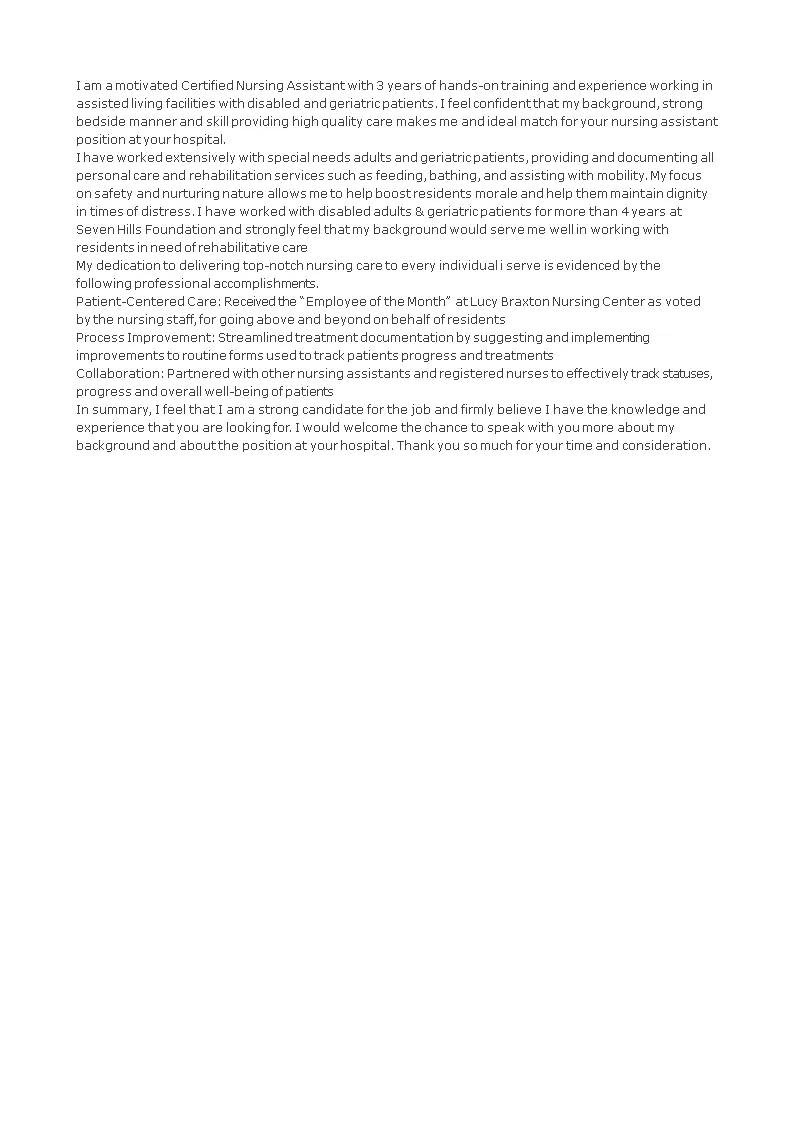
Researching the Hiring Manager
Before you write your cover letter, research the hiring manager. Find out their name, title, and any relevant background information. This will help you address the letter appropriately and personalize your message. You can often find information on LinkedIn or the organization’s website. If you know the hiring manager’s background, you can better tailor your letter to resonate with their interests.
Customizing for Each Job Application
Don’t use a generic cover letter for every job application. Customize your letter to match the specific requirements and qualifications outlined in the job description. Highlight the skills and experiences that are most relevant to the role. Tailoring your letter demonstrates that you have carefully considered the position and are genuinely interested in the opportunity. This attention to detail can significantly increase your chances of landing an interview.
Examples of Excellent Nurse Cover Letters
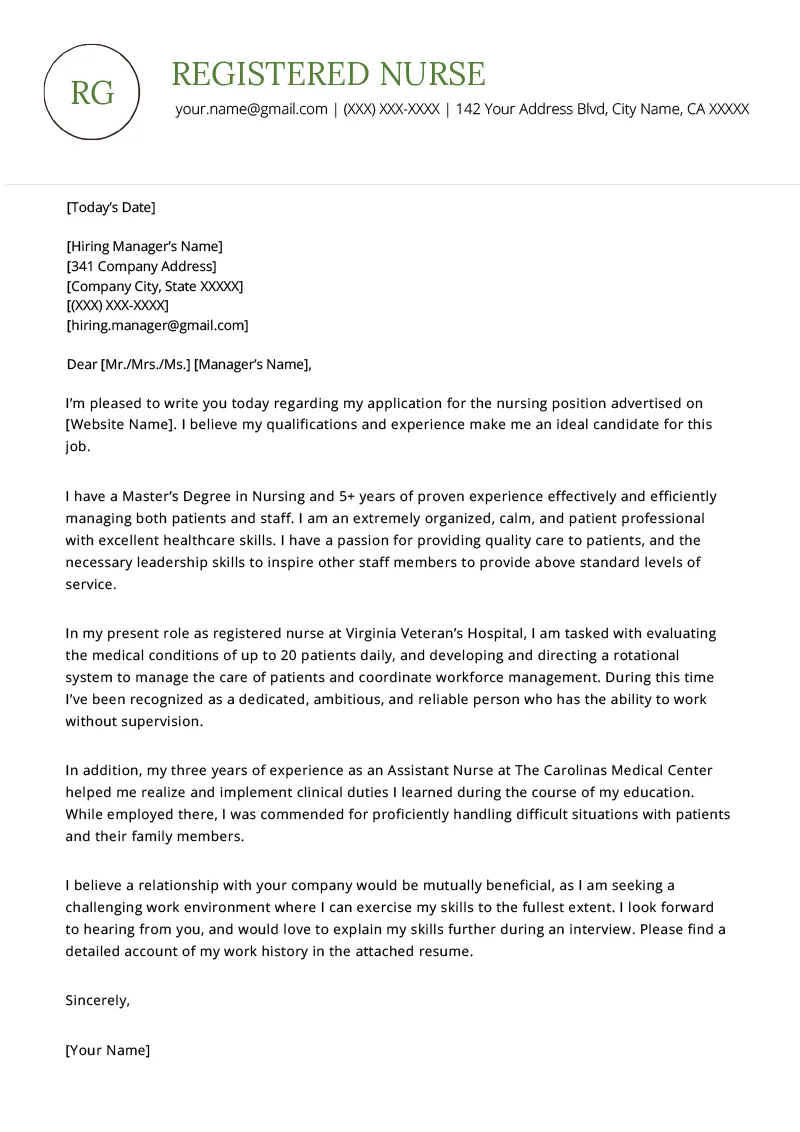
Cover Letter Example 1
Dear [Hiring Manager Name],
I am writing to express my enthusiastic interest in the Registered Nurse position at [Hospital Name], as advertised on [Platform]. With five years of experience in medical-surgical nursing and a passion for providing exceptional patient care, I am confident I possess the skills and dedication to excel in this role.
In my previous role at [Previous Hospital], I consistently provided comprehensive care to a diverse patient population. I have a proven track record of accurately administering medications, monitoring patient conditions, and collaborating effectively with physicians and other healthcare professionals. I am adept at electronic health records (EHR) and have successfully implemented patient education programs that improved patient outcomes. I was also a part of a team that reduced patient readmission rates by 15% by providing personalized care plans.
I am particularly drawn to [Hospital Name]’s commitment to [Hospital’s Mission/Value]. My goal is to be a dedicated nurse to improve patient’s lives. I am confident that my clinical skills, my patient-centered approach, and my passion for nursing will make me a valuable addition to your team. I look forward to the opportunity to discuss my qualifications further. Thank you for your consideration. My phone number is [Phone Number] and my email is [Email Address].
Sincerely, [Your Name]
Cover Letter Example 2
Dear [Hiring Manager Name],
I am writing to express my interest in the Nurse Practitioner position at [Clinic Name], as advertised on [Platform]. I am a certified Nurse Practitioner with a specialization in family medicine. With a strong background in primary care and a commitment to patient-centered care, I am confident I can contribute greatly to your team.
During my time at [Previous Clinic], I was responsible for the diagnosis, treatment, and management of patients of all ages. I am skilled in performing physical examinations, ordering and interpreting diagnostic tests, and prescribing medications. I have a strong track record of building rapport with patients and providing them with compassionate and comprehensive care. I initiated a patient education program on diabetes that enhanced patient knowledge and self-management.
I admire [Clinic Name]’s dedication to community health and its patient-focused approach. I am eager to join a team that values patient care and supports its medical staff. I would welcome the opportunity to discuss my qualifications in an interview. I can be reached at [Phone Number] or via email at [Email Address].
Sincerely, [Your Name]
Common Mistakes to Avoid in a Nurse Cover Letter
Using Generic Language
Avoid using generic phrases that could apply to any job. Tailor your letter to each specific position, demonstrating that you understand the requirements of the role and have the skills and experience to meet them. Generic language makes your letter less memorable and can make you seem less interested in the specific opportunity. Show you have done your homework.
Focusing on “I” Instead of “You”
While it is essential to highlight your skills and achievements, avoid making your cover letter overly self-centered. Focus on how your skills and experience can benefit the employer and the patients. Shift the focus from ‘I’ to ‘You’ by explaining how your abilities align with the needs of the organization and contribute to their goals. Show the hiring manager what you can do for them.
Ignoring the Job Description
Always carefully read the job description and tailor your cover letter to address the specific requirements and qualifications listed. Ignoring the job description will cause you to miss the opportunity to show how you align with the role. Highlight the key skills, experience, and certifications mentioned in the job description, and provide specific examples of how you have demonstrated those qualities in the past. Show that you have what they want.
